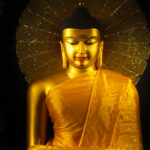The Protectors of the World
“Bhikkhus, these two bright qualities protect the world. What two? Moral shame and moral dread.”
AN 2.9 – Cariya Sutta
We should have faith in the Buddha’s Enlightenment in order to accept his teachings on the wholesome and unwholesome. If we accept his teachings and gain an understanding of the benefits of cultivating the wholesome, and the dangers involved in engaging in unwholesome actions, bit by bit two qualities develop in us: moral shame (hiri) and moral dread (ottappa).
What Is Moral Shame and Moral Dread?
The Buddha defines moral shame and moral dread, two of the five powers of a trainee (sekha bala), thus:
“And what is the power of moral shame? Here, a noble disciple has a sense of moral shame; he is ashamed of bodily, verbal, and mental misconduct; he is ashamed of acquiring evil, unwholesome qualities. This is called the power of moral shame.
“And what is the power of moral dread? Here, a noble disciple dreads wrongdoing; he dreads bodily, verbal, and mental misconduct; he dreads acquiring evil, unwholesome qualities. This is called the power of moral dread.”
AN 5.2 – Vitthata Sutta
Directed Inward and Outward
Now, though these two qualities are similar, as we can see from the Buddha’s definitions, they are in fact different. The difference lies in their emphasis. Moral shame as a good quality is directed internally, whereas moral dread is directed outwardly. We may understand moral shame as a sense of conscience, or self-esteem, which, upon reflecting on unwholesome actions, considers them unworthy for oneself—“If I were to act in such a way, I would be ashamed of my conduct.” Moral dread, on the other hand, is directed outwardly toward society. When one “dreads bodily, verbal, and mental misconduct,” one is afraid of their dangerous consequences. For example, for a disciple with moral dread established, he/she fears breaking any of the five precepts since, if others found out about one’s misconduct—one’s parents, teachers, friends, peers, spiritual teachers—one would lose face, and perhaps receive punishment for one’s misbehavior. Further, we can also understand moral dread to encompass a reflective understanding of the kammic dangers involved in engaging in unwholesome deeds, for their results (vipāka) bring rebirth in the lower realms and extended periods of suffering.
Guilt and Remorse Are Unwholesome
Moreover, it is prudent to emphasize that moral shame and moral dread are not feelings of guilt or remorse. Guilt and remorse are unwholesome; remorse is one of the five hindrances that block progress in meditation. If for some reason one engages in misconduct—say, out of heedlessness, strong emotions, or a lapse of mindfulness—one should not cultivate feelings of guilt or remorse, but rather endeavor to refrain from such actions in the future. Since the action has already been done, it is in the past now, finished. We need not revive the past by brooding over our previous misdeeds; rather, we should make an effort to purify our actions in the present. To do so, we must cultivate a sense of moral shame and moral dread.
In this way, moral shame and moral dread help us to develop virtue (sīla). To purify our bodily, verbal, and mental actions, we should first establish ourselves in these two internal qualities. If we do not first establish ourselves in these qualities, it will be difficult to properly develop virtue. Why? Because we lack the supporting internal conditions.
Domino Effect
We cannot develop virtue simply out of an act of will; we cannot make the determination: “May I become virtuous!” and develop virtuous behavior through that alone. Rather, we must create the necessary causes in our lives in order to become virtuous. The Buddha, with his all-encompassing wisdom, understood in their entirety the factors involved in developing the mind; and he further understood how these factors influence each other in succession to bring about a domino effect, a concatenation of wholesome qualities with one factor serving as the supporting condition for the arising of the second, the second serving as a supporting condition for the third, etc. In the Aṅguttara Nikāya, we come across a discourse wherein the Buddha explains how the qualities of moral shame and moral dread shape a disciple’s development of the path not just in terms of virtue, but all the way up to liberation, the realization of Nibbāna.
“Monks, (1) when there is no sense of moral shame and moral dread, for one deficient in a sense of moral shame and moral dread, (2) restraint of the sense faculties lacks its proximate cause. When there is no restraint of the sense faculties, for one deficient in restraint of the sense faculties, (3) virtuous behavior lacks its proximate cause. When there is no virtuous behavior, for one deficient in virtuous behavior, (4) right concentration lacks its proximate cause. When there is no right concentration, for one deficient in right concentration, (5) the knowledge and vision of things as they really are lacks its proximate cause. When there is no knowledge and vision of things as they really are, for one deficient in the knowledge and vision of things as they really are, (6) disenchantment and dispassion lack their proximate cause. When there is no disenchantment and dispassion, for one deficient in disenchantment and dispassion, (7) the knowledge and vision of liberation lacks its proximate cause.”
Simile of the Tree
The Buddha then proceeds to illustrate this conditioning process with a simile drawn from his surroundings, the forests of ancient India wherein he most often dwelled:
“Suppose there is a tree deficient in branches and foliage. Then its shoots do not grow to fullness; also its bark, softwood, and heartwood do not grow to fullness. So too, when there is no sense of moral shame and moral dread, for one deficient in a sense of moral shame and moral dread, restraint of the sense faculties lacks its proximate cause. When there is no restraint of the sense faculties . . . the knowledge and vision of liberation lacks its proximate cause.”
AN 7.65 – Hirīottappa Sutta
For a tree to grow properly and fully, it must have enough branches and leaves. Without a certain number of branches and leaves, the tree is unable to reach its full potential in growth. But when a tree has enough branches and leaves, it can grow to its full potential. In the same way, we must base ourselves in moral shame and moral dread in order to fully grow as disciples of the Buddha. The opposites of these qualities—moral shamelessness and moral recklessness—we should make every effort to abandon.
Two Qualities of Utmost Necessity in Developing the Noble Path
The Buddha further describes how essential these qualities are to abandon the unwholesome and develop the wholesome:
“There is no entering upon the unwholesome so long as a sense of moral shame is securely settled in [cultivating] wholesome qualities. But when a sense of moral shame has disappeared and moral shamelessness obsesses one, then there is the entering upon the unwholesome. “There is no entering upon the unwholesome so long as moral dread is securely settled in [cultivating] wholesome qualities. But when moral dread has disappeared and lack of moral dread obsesses one, then there is the entering upon the unwholesome.”
AN 5.6 – Samāpatti Sutta
Thus, in order to cultivate wholesome actions, which yield merit and assist us in practicing the Noble Eightfold Path, we should make a concerted effort to establish ourselves in two qualities: moral shame and moral dread. If we are able to do so, surely we will reap the benefits of this Gotama Buddha’s Dispensation.
By a Venerable Thero of Mahamevnawa Buddhist Monastery














Recent Comments